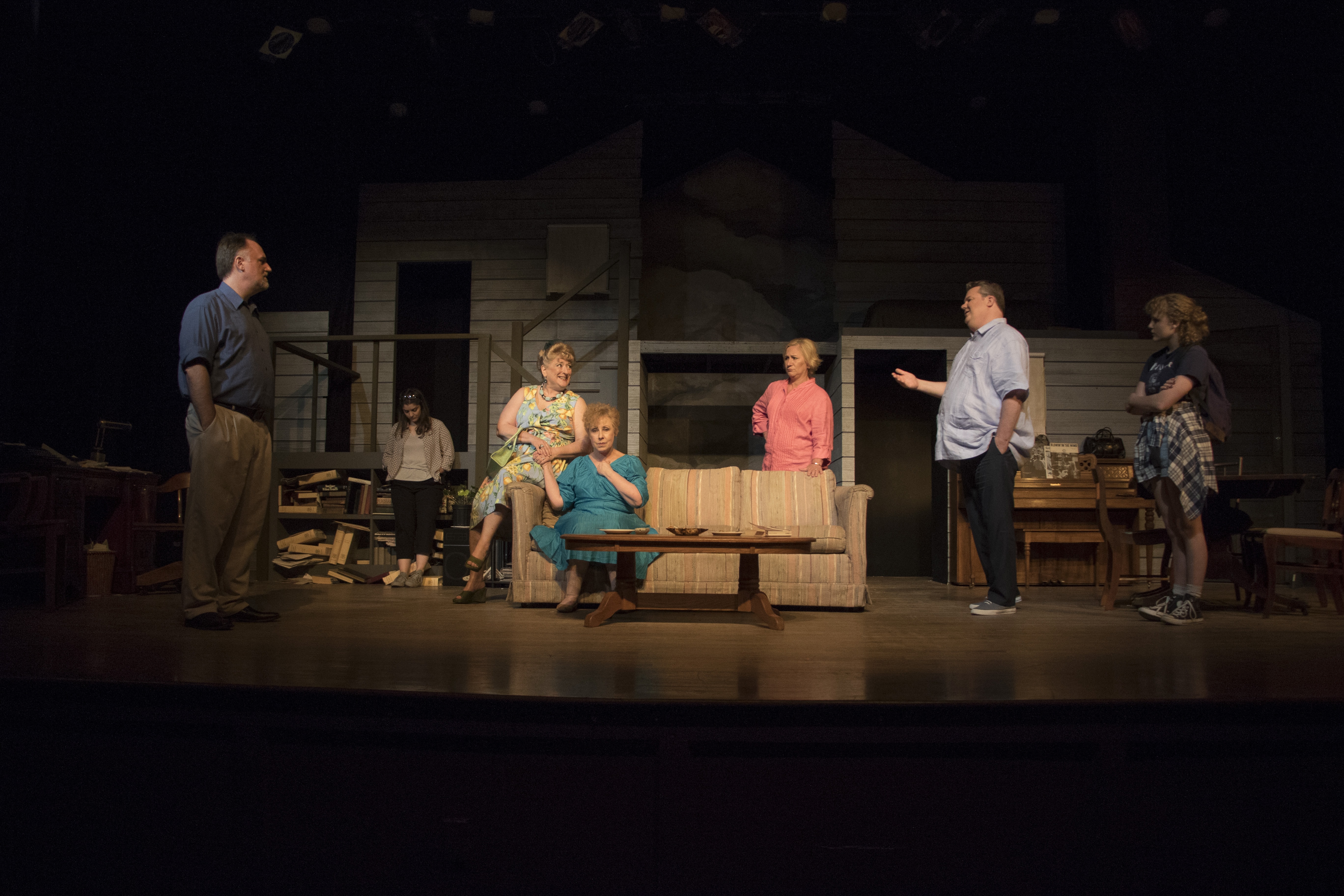The Little Theatre of Alexandria’s production of August: Osage County, the 2007 Pulitzer Prize-winning play by Terry Letts, pulls off the condensed, soap-opera feel of a family forced to deal with a glut of past hurts during a funereal family reunion. The over-abundance of family issues and secrets would almost be funny (especially in a script filled with witty repartee and one-liners), if not for two major forces: the acerbic, neurotic characterization of the matriarch, Violet Weston, who infects the rest of the family with her bitterness; and the ingenious hints that this dysfunctional family’s guilt is somehow tied to America’s own past regarding Native Americans. Director Susan Devine skillfully and clearly elucidates the play’s subtle message. The cast also shows the remarkable ability to make us believe that their characters are really that vulnerable, loving, witty, detestable, sleazy, selfish, dutiful, helpless and ignorant (sometimes all at the same time).

The play opens on a set showing three split levels of a clapboard house that gives the feel of being somewhere out west. Indeed, the play is set on the Oklahoma plains. Seeming to split the house in half is a ceiling-high screen painted with roiling clouds or majestic mountains and backlit with varying colors depending on the scene’s mood.
Sitting at his writing desk, is the Weston family patriarch, Beverly (Fred C. Lash), who is conducting a job interview with Johnna Monevata, a Native American woman, who sits in dignified silence while Beverly quotes T.S. Eliot. Beverly tells Johnna, “My wife takes pills, and I drink. That’s the little deal we’ve struck,” foreshadowing the trouble to come.
Beverly ultimately hires Johnna to take care of his wife, Violet (Diane Sams), who has mouth cancer. The scene ends when Beverly gives Johnna his prized possession, a book by T.S. Eliot. We get the feeling that Beverly is going somewhere–and he soon disappears.
Other family members appear: Beverly and Violet’s three daughters, Barbara Fordham and Ivy and Karen Weston (played by Nicky McDonnell, Carlotta Capuano, and Elizabeth Keith, respectively); Violet’s sister, Mattie Fae Aiken (Gayle Nichols-Grimes); and husbands, boyfriends, and children of the women. They have come to mourn Beverly’s loss but are thrown into the maelstrom caused by the unsteady, drug-addicted, and bitter Violet, who wants the rest of the family to suffer as much as she does. The ensuing action explores the dynamics of a dysfunctional family with more skeletons in its closets than those displayed on a full season of Jerry Springer. Through a mostly witty, but sometimes biting and at places even dull script, the cast of family members exhumes each of their skeletons, even as they bury Beverly.
Through clever use of set (design: Dan Remmers, decoration: Charles Dragonette), lighting (Franklin Coleman), sound design (Alan Wray), and blocking, director Devine highlights the guilt of our nation regarding historical treatment of Native Americans. This guilt somehow causes or at least parallels the guilt experienced by the Westons in Osage County.
Set painting by Mary Speed significantly contributes to the tone and theme of the play. The ceiling-high painted screen depicts clouds or mountains, and the expanse of it is reminiscent of skies or mountains viewed in the distance on the open American plains. At the opening of the play, the lights color the screen a bluish-gray. This reflects Barbara Fordham’s lines “This is the Plains: a state of mind, right, some spiritual affliction, like the Blues.” Along with the “blue” plains, fluted Native American music plays hauntingly between scenes. And like the Native Americans, Violet’s caretaker, Johnna (Katarina Frustaci), is a haunting presence. Sometimes she is up in her room, visible by a muted spotlight. Other times she is sitting at the dinner table, placed closest to the audience, while a heated argument (the main action) is occurring at the other end. Through it all, Johnna looks on, dignified, but usually silent.
While the lighting behind the ceiling-high screen contributed to the play’s atmosphere and theme, the sometimes-muted spotlighting contributed to a drag in the action. It was distracting when the main spotlight was on a conversation between two characters in one place and muted spots showed action at the dinner table. Also, the lighting on the table during the dinner scene was a little dark and it was difficult to follow the action at the head of the table, which was furthest from the audience.
Gayle Nichols-Grimes’ portrayal of Mattie Fae Aiken (Violet’s younger sister) is impeccable. She delivers each joke and hit every line with perfect timing. Nichols-Grimes delivers her lines like she’s carrying on a conversation and provides a fresh, funny counterpoint to Diane Sams’ toxic, unbalanced Violet.

Sams masterfully portrays a narcotized Violet; a woman trying to forget her past and shortcomings. Sams wavers onto the set and delivers her lines in a slurred manner, lending credence to Violet’s drugged state. However, sometimes this attempt to physically remind us of Violet’s debilitated state slows the pace. Some efficiencies in the three-hour thirty-minute production could be had here.
Nicky McDonnell is amazing as Barbara, at turns uproariously funny and deadly serious. She possesses perfect timing and delivery, as seen in the humorous maxim, “Thank God we can’t tell the future, we’d never get out of bed.” And, bringing Jerry Springer right into the theater, she has a physical altercation with Violet. Kudos to Stage Combat Choreographer Steve Lada for a believable fight scene that would have made Jerry proud.
Little Theatre of Alexandria’s production of August: Osage County has all the elements of a year of General Hospital or a season of Jerry Springer: insults, crushed dreams, betrayal, verbal and physical abuse, drinking, drugs, and sex, all packaged in a witty, clever script and delivered in a finely directed and acted presentation. Not recommended for the young, faint of heart, or anyone carrying around a pince-nez or a lace handkerchief.
Running Time: Approximately three hours and 30 minutes, including one 15-minute and one 10-minute intermission.
August: Osage County plays through Sunday, September 23, 2018, at Little Theatre of Alexandria, 600 Wolfe Street, Alexandria, VA 22314. For tickets, purchase them online.





The set designer is Dan Remmers, and the set decorator is Charles Dragonette.
Fixed. Thanks for pointing that out.